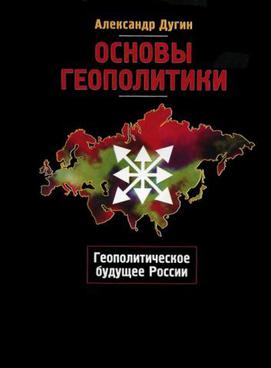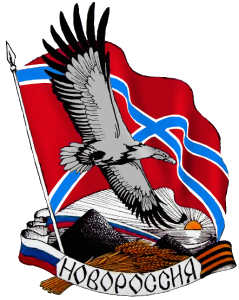Related Research Articles
Geopolitics is the study of the effects of Earth's geography on politics and international relations. While geopolitics usually refers to countries and relations between them, it may also focus on two other kinds of states: de facto independent states with limited international recognition and relations between sub-national geopolitical entities, such as the federated states that make up a federation, confederation, or a quasi-federal system.

The Eurasia Party is a National Bolshevik Russian political party. It was registered by the Ministry of Justice on 21 June 2002, approximately one year after the pan-Russian Eurasia Movement was established by Aleksandr Dugin.

Alain de Benoist, also known as Fabrice Laroche, Robert de Herte, David Barney, and other pen names, is a French political philosopher and journalist, a founding member of the Nouvelle Droite, and the leader of the ethno-nationalist think tank GRECE.

Aleksandr Gelyevich Dugin is a Russian far-right political philosopher.

Jean-François Thiriart, often known as Jean Thiriart, was a Belgian far-right political theorist.

The National Bolshevik Front is a Russian political party with a political program of National Bolshevism. The party was founded in 2006 by supporters of Aleksandr Dugin following a split within Eduard Limonov's National Bolshevik Party. The NBF is affiliated with Dugin's Eurasian Youth Union.

The Symbol of Chaos originates from Michael Moorcock's Elric of Melniboné stories and their dichotomy of Law and Chaos. In them, the Symbol of Chaos comprises eight arrows in a radial pattern.

The Progressive Socialist Party of Ukraine (PSPU) is a banned, pro-Russian political party in Ukraine led by Nataliya Vitrenko. The party was represented in Ukraine's national parliament between 1998 and 2002. The party is considered neo-communist and wants to restore state ownership of industry and workers' democracy in Ukraine. Due to ideological ties to Dugin, it has also been described by some observers as being National Bolshevik.
Neo-Stalinism is the promotion of positive views of Joseph Stalin's role in history, the partial re-establishing of Stalin's policies on certain or all issues, and nostalgia for the Stalinist period. Neo-Stalinism overlaps significantly with neo-Sovietism and Soviet nostalgia. Various definitions of the term have been given over the years.
Eurasianism is a socio-political movement in Russia that emerged in the early 20th century under the Russian Empire, which states that Russia does not belong in the "European" or "Asian" categories but instead to the geopolitical concept of Eurasia governed by the "Russian world", forming an ostensibly standalone Russian civilization.
Radical Network (French: Réseau radical was a French far-right study group from 2002 to 2006. Formed in June 2002, a number of its early members came from those who split from Unité Radicale that April, notably Christian Bouchet, Luc Bignot and Giorgio Damiani.

The Eurasian Youth Union is a Russian traditionalist political organization, the youth wing of the Eurasia Party headed by Aleksandr Dugin. The organization has branches in several countries. In 2011, the Government of Ukraine has branded the ESM as an extremist anti-Ukrainian organization, convicted of a string of vandalism offenses and banned it in Ukraine.

The Foundations of Geopolitics: The Geopolitical Future of Russia is a geopolitical book by Aleksandr Dugin. Its publication in 1997 was well received in Russia; it has had significant influence within the Russian military, police, and foreign policy elites, and has been used as a textbook in the Academy of the General Staff of the Russian military. Powerful Russian political figures subsequently took an interest in Dugin, a Russian political analyst who espouses an ultranationalist and neo-fascist ideology based on his idea of neo-Eurasianism, who has developed a close relationship with Russia's Academy of the General Staff.
Conspirology is a term the Russian philosopher Aleksandr Dugin coined in his work Konspirologiya: Nauka o zagovorah, tajnyh obshhestvah i okkultnoj vojne. Accordingly, it is a framework which studies conspiracy theories, secret societies, and their geopolitical conflicts, from the perspective of esoteric thought, non-Catholic eschatology, demonology, and the occult,as opposed to religious studies. Dugin primarily uses it to cover the conflict between what he considers to be Atlanticism and Eurasianism.

National Bolshevism, whose supporters are known as National Bolsheviks and colloquially as Nazbols, is a syncretic political movement committed to combining ultranationalism and communism.

The New Russia Party, or Novorossiya Party, is a political party operating in Ukraine, and in particular regions of Ukraine annexed by Russia The organization was founded by pro-Russian separatists, under the leadership of Pavel Gubarev, on 14 May 2014. The party is formally known as the Social-Political Movement "New Russia Party". It is not registered with the Ministry of Justice of Ukraine.
Le Figaro Magazine is a French language weekly news magazine published in Paris, France. The magazine is the weekly supplement of the daily newspaper Le Figaro and has been in circulation since 1978.
Tellurocracy is a concept proposed by Aleksandr Dugin to describe a type of civilization or state system that is defined by the development of land territories and consistent penetration into inland territories. Tellurocratic states possess a set state-territory in which the state-forming ethnic majority lives, around this territory further land expansion occurs. Tellurocracy is conceived of as an antonym to thalassocracy.

Éléments is a French bi-monthly magazine launched in September 1973 and associated with the Nouvelle Droite. It is published by the white nationalist thinktank GRECE.
Robert Steuckers is a Belgian writer and political activist on the far right, associated with the European New Right. He is a former member of GRECE and formed his own organisation Synergies européennes in 1994. He promotes pan-European nationalism and has been described as close to the Identitarian movement.
References
- 1 2 3 John B. Dunlop (2006). "Aleksandr Dugin's Foundations of Geopolitics". The Europe Center. Retrieved 22 January 2023.
- 1 2 Anton Shekhovtsov (July 2009). "Aleksandr Dugin's Neo-Eurasianism: The New Right à la Russe". Religion Compass. 3 (4): 697–716. doi:10.1111/j.1749-8171.2009.00158.x.
- ↑ Eduard G. Solovyev (March 2004). "Geopolitics in Russia—science or vocation?". Communist and Post-Communist Studies. 37 (1): 90. doi:10.1016/j.postcomstud.2003.12.009. JSTOR 48609489.
- 1 2 3 Tamir Bar-On (2012). "The French New Right's Quest for Alternative Modernity". Fascism. 1 (1): 20. doi: 10.1163/221162512X631198 . S2CID 153968851.
- 1 2 3 4 5 Marlene Laruelle (2006). "Aleksadr Dugin: A Russian Version of the European Radical Right" (Occasional Papers). Washington, D.C.: Woodrow Wilson International Center for Scholars. pp. 1, 3, 10, 13. Retrieved 22 January 2023.
- 1 2 "Миры Алистера Кроули" (in Russian). VK. 5 October 2015. Retrieved 22 January 2023.